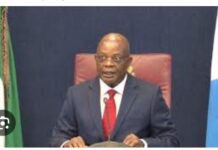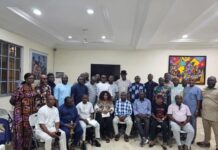A Nation in Peril
Nigeria, once hailed as the giant of Africa, is now teetering on the brink of collapse. With its economy in freefall and security situation deteriorating rapidly, the cries for change are growing louder. Amidst this chaos, the Nigerian Indigenous Nationalities Alliance for Self-determination (NINAS) has been a consistent voice advocating for a fundamental reconstruction of Nigeria’s constitutional framework. The latest development in this ongoing saga is the endorsement of NINAS’ constitutional reset campaign by four prominent Nigerians: Dr. Ngozi Okonjo-Iweala, Prof. Kingsley Moghalu, Dr. Oby Ezekwesili, and Senator Seriake Dickson. Their support, however, has been met with a deafening silence from the highest office in the land, leaving Nigerians to wonder if their president, Bola Tinubu, truly understands the gravity of the situation.
NINAS’ Call for a Constitutional Reset
NINAS has long argued that Nigeria’s current constitution is fundamentally flawed, describing it as the root cause of the country’s multifaceted crises. The alliance’s proposition for a constitutional reset is not just a political manoeuvre but a desperate plea to salvage a nation on the verge of disintegration. The support from Dr. Ngozi Okonjo-Iweala, the current Director-General of the World Trade Organisation (WTO) and former Finance Minister, adds significant weight to this campaign. At the 2024 Nigerian Bar Association (NBA) Annual Conference, Okonjo-Iweala stated unequivocally that Nigeria requires a new social contract to ensure its survival, stability, and growth. This is not merely an economic prescription but a call for a complete overhaul of the system that has consistently failed its people.
The Voices of the New Converts
Dr. Ngozi Okonjo-Iweala’s declaration is a pivotal moment in the NINAS campaign. Her experience as a global economic leader gives her words immense credibility. But she is not alone. Prof. Kingsley Moghalu, a former Deputy Governor of the Central Bank of Nigeria and an ex-presidential candidate, has also thrown his weight behind the call for a constitutional reset. Moghalu has consistently advocated for structural reforms in Nigeria, and his alignment with NINAS’ vision underscores the urgency of the situation.
Dr. Oby Ezekwesili, a former Minister of Education and ex-Vice President at the World Bank, has been a relentless critic of Nigeria’s current political system. Her endorsement of NINAS’ campaign is a natural progression of her advocacy for good governance and accountability. Senator Seriake Dickson, the immediate-past Governor of Bayelsa State, completes this quartet of new converts. Dickson’s experience in navigating the complexities of Nigeria’s federal structure adds a political dimension to the economic and social arguments for a constitutional reset.
The Tragic Irony: Tinubu’s Misplaced Priorities
While these respected voices call for a fundamental reconstruction of Nigeria’s constitutional foundation, President Bola Tinubu remains obstinately focused on economic reforms. In a meeting with the Emeka Anyaoku-led Patriots Delegation, which advocated for an urgent constitutional reconstruction, Tinubu reportedly stated that he would prioritise fixing the economy before addressing the constitutional question. This response has been met with widespread dismay, as it underscores a fundamental disconnect between the government’s priorities and the needs of its people.
Nigerians are grappling with severe economic hardship, exacerbated by a deteriorating security situation. For many, the constitution is not an abstract legal document but the source of their daily suffering. The current constitution, which centralises power and resources in a way that stifles development and breeds corruption, is seen as the root cause of the country’s woes. By refusing to address this foundational issue, Tinubu is effectively telling Nigerians that their suffering is secondary to his economic agenda.
The Consequences of Inaction
The implications of Tinubu’s stance are dire. Nigeria is at a critical juncture where the wrong decisions could plunge the country into even deeper turmoil. The refusal to engage in a meaningful dialogue about constitutional reform risks alienating large segments of the population, particularly in the regions that feel marginalized by the current system. The growing support for NINAS’ campaign suggests that this is not just a fringe movement but a reflection of widespread dissatisfaction with the status quo.
Furthermore, the international community is watching. As Nigeria’s economic and security situation continues to deteriorate, global partners may begin to lose confidence in the country’s ability to govern itself effectively. The support from figures like Okonjo-Iweala, who holds significant influence in international circles, highlights the growing concern that Nigeria’s problems are not just domestic but have global implications.
A Union at Gunpoint: The Reality of Nigeria’s Unitary State
One of the most profound critiques of Nigeria’s current structure comes from Prof. (Fr.) Anthony Akinwale, who has described the country as a “union-at-gunpoint.” This characterisation speaks to the coercive nature of Nigeria’s federal system, where power is concentrated in the hands of a few at the expense of the many. Akinwale’s critique is not just rhetorical but reflects the lived reality of millions of Nigerians who feel trapped in a system that offers them no real representation or autonomy.
This sense of alienation is at the heart of the NINAS campaign. The alliance’s call for a constitutional reset is, in essence, a demand for a new social contract that recognizes the diverse identities and aspirations of Nigeria’s various nationalities. Without this fundamental shift, the country risks descending further into conflict and instability.
The Role of the Media: Amplifying the Call for Change
As the fourth estate of the realm, it is the duty of the media to amplify the voices calling for change in Nigeria. The media has a critical role to play in this ongoing struggle, not just as observers but as active participants in the national discourse. We must hold our leaders accountable, challenge the status quo, and ensure that the cries of the Nigerian people do not go unheard.
The support for NINAS’ campaign from prominent figures like Okonjo-Iweala, Moghalu, Ezekwesili, and Dickson should serve as a wake-up call for all Nigerians. This is not just a political issue but a matter of national survival. The time for half-measures and empty promises is over. Nigeria needs a fundamental reconstruction of its constitutional framework, and it needs it now.
Conclusion: A Call to Action
The future of Nigeria hangs in the balance. The NINAS campaign for a constitutional reset is not just about changing a document but about reimagining the very foundation of the Nigerian state. It is about creating a system that works for all Nigerians, not just a privileged few. The support from Okonjo-Iweala, Moghalu, Ezekwesili, and Dickson is a testament to the urgency of this cause. But their voices alone are not enough. It is up to every Nigerian to demand the change that this country so desperately needs.
President Tinubu’s focus on economic reforms is commendable, but without addressing the root cause of Nigeria’s problems – its flawed constitution – any progress will be short-lived. The time has come for bold, decisive action. The time has come for a constitutional reset.











